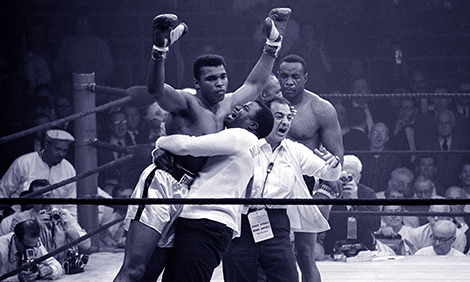


Muhammad Ali won in a rematch fight against Sonny Liston in Lewiston, Maine, on May 25, 1965.
Muhammad Ali, a celebrated boxer and human rights activist, died on June 3, 2016, at the age 74. From the start of his superstardom in the sports world in the 1960s to the final years of his life, he was a living legend. He wasn’t just famous for being a sports hero. He was also well known for standing up for what he believed in and helping those in need throughout the world.
Born in Louisville, Kentucky, in 1942, Ali began his life as Cassius Clay, Jr. Growing up in the segregated South, he experienced racial discrimination and prejudice firsthand. These early experiences helped shape his worldview and the compassion he developed for those whose lives he wanted to make better.
At the age of 12, Clay started learning how to box. In 1960, when he was 18 years old, he took part in the Summer Olympics, which was hosted in Rome. He won the gold medal in light heavyweight boxing and soon became a professional boxer.
Clay fought heavyweight champion Sonny Liston for the world title in 1964. He bragged that he would beat Liston because he was able to “float like a butterfly and sting like a bee.” His prediction came true. He won the fight against Liston and became the new heavyweight champion. Afterwards, he told everyone that he was “the greatest,” a nickname he was known for his entire life.
The same year he became the heavyweight champion, Clay converted to the religion of Islam. He changed his name to Muhammad Ali to honor his new faith. Ali caused much controversy when he refused to be drafted to serve in the Vietnam War. He stated that the war conflicted with his Muslim faith and his own personal beliefs. He said that he had a problem with racism in the United States, not with the people in Vietnam. He spoke out often and forcefully against the racial discrimination that African Americans regularly faced.
As a result of his refusal to serve, Ali was convicted of draft evasion, stripped of his heavyweight title, and banned from boxing. However, in 1970, the U.S. Supreme Court ruled that because of his beliefs, he had the right to be a conscientious objector of the war. He returned to boxing in 1971 to challenge Joe Frazier, the new heavyweight champion. Ali lost the fight, but regained his title in 1974 when he beat George Foreman. In all, Ali won the heavyweight title a record three times. When he retired from boxing in 1981, he had won 56 fights and lost only five.
Three years into his retirement, Ali was diagnosed with Parkinson’s disease, a disorder of the nervous system that affected his movement and speech. However, Ali did not let this slow him down. He spent much of his time helping people in need and working for peace and equality throughout the world.
For 10 years, Ali served as a Messenger of Peace for the United Nations. During that time, he sometimes hand-delivered food and medicine to those in need in Africa and Asia. In 2005, President George W. Bush awarded him the Presidential Medal of Freedom, America’s highest civilian honor. Ali’s lifetime of achievements and his work to better the lives of others make him one of the greatest and most unforgettable heroes in American history.


























